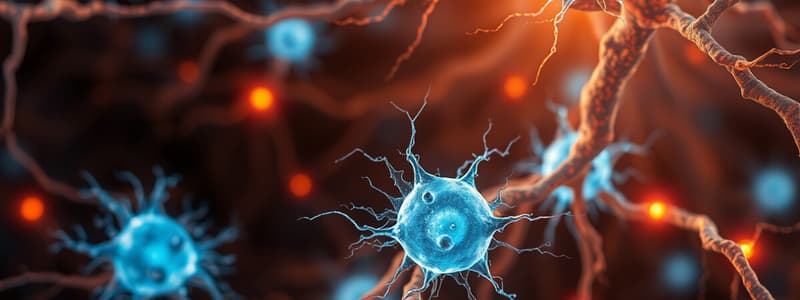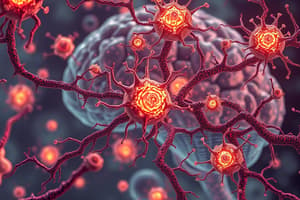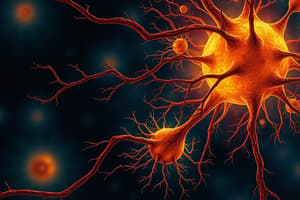Podcast
Questions and Answers
Which type of neuroglial cell is categorized as a protoplasmic astrocyte?
Which type of neuroglial cell is categorized as a protoplasmic astrocyte?
- Choroidal epithelial cell
- Fibrous astrocyte (correct)
- Ependymocyte
- Oligodendrocyte
What is the primary function of oligodendrocytes in the central nervous system?
What is the primary function of oligodendrocytes in the central nervous system?
- Support neuronal metabolism
- Remove debris from neuronal injury
- Form myelin sheaths around axons (correct)
- Generate synaptic connections
Which cell type is derived from neuroepithelial stem cells during gliogenesis?
Which cell type is derived from neuroepithelial stem cells during gliogenesis?
- Astrocytes
- Ependymal cells
- Both A and B (correct)
- Microglial cells
In the peripheral nervous system, which neuroglial cells are known for their role in myelination?
In the peripheral nervous system, which neuroglial cells are known for their role in myelination?
Which of the following neuroglial cells is involved in the immune response in the central nervous system?
Which of the following neuroglial cells is involved in the immune response in the central nervous system?
What role do perineural satellite cells serve in the peripheral nervous system?
What role do perineural satellite cells serve in the peripheral nervous system?
Which type of neuroglial cell is least likely to be involved in myelination within the central nervous system?
Which type of neuroglial cell is least likely to be involved in myelination within the central nervous system?
The process of Wallerian degeneration primarily involves what?
The process of Wallerian degeneration primarily involves what?
What classification indicates that a peripheral nerve injury is characterized by complete interruption of the nerve structure?
What classification indicates that a peripheral nerve injury is characterized by complete interruption of the nerve structure?
Which condition is primarily associated with difficulties in swallowing?
Which condition is primarily associated with difficulties in swallowing?
What is one reason why axonal regeneration is not possible in the CNS?
What is one reason why axonal regeneration is not possible in the CNS?
Which of the following statements about demyelination is true?
Which of the following statements about demyelination is true?
What is a hallmark of Seddon's class I peripheral nerve injury?
What is a hallmark of Seddon's class I peripheral nerve injury?
What shape do active microglial cells typically exhibit?
What shape do active microglial cells typically exhibit?
Which cellular component is prominent in active microglial cells?
Which cellular component is prominent in active microglial cells?
What is one of the primary functions of active microglial cells?
What is one of the primary functions of active microglial cells?
In what pathological states do active microglial cells release proinflammatory mediators?
In what pathological states do active microglial cells release proinflammatory mediators?
What term is used for inactive microglial cells in a normal state?
What term is used for inactive microglial cells in a normal state?
Which neurodegenerative diseases are associated with active microglial functions?
Which neurodegenerative diseases are associated with active microglial functions?
What molecular signaling molecules do active microglial cells involve in their functions?
What molecular signaling molecules do active microglial cells involve in their functions?
Which feature distinguishes active microglial cells from other glial cells during their activation?
Which feature distinguishes active microglial cells from other glial cells during their activation?
What is the primary function of the Blood-Brain Barrier?
What is the primary function of the Blood-Brain Barrier?
Which cells are responsible for the production of myelin in the central nervous system?
Which cells are responsible for the production of myelin in the central nervous system?
What is the significance of myelination in adult neurons?
What is the significance of myelination in adult neurons?
What type of cells line the ventricles of the brain and produce cerebrospinal fluid?
What type of cells line the ventricles of the brain and produce cerebrospinal fluid?
Which characteristic defines oligodendrocytes?
Which characteristic defines oligodendrocytes?
Which of the following statements about ependymal cells is true?
Which of the following statements about ependymal cells is true?
What limits the ability of substances like amoxicillin from entering the bloodstream in the brain?
What limits the ability of substances like amoxicillin from entering the bloodstream in the brain?
What discovery method was used to identify oligodendrocytes?
What discovery method was used to identify oligodendrocytes?
What type of information do ascending tracts primarily carry?
What type of information do ascending tracts primarily carry?
What is the primary role of descending tracts?
What is the primary role of descending tracts?
Which cells become amoeboid when activated in response to injury?
Which cells become amoeboid when activated in response to injury?
During Wallerian degeneration, which process does NOT occur?
During Wallerian degeneration, which process does NOT occur?
In the context of the nervous system, what are Schwann cells primarily associated with?
In the context of the nervous system, what are Schwann cells primarily associated with?
What is NOT a characteristic of the ascending tracts?
What is NOT a characteristic of the ascending tracts?
Which type of tract would be responsible for conveying a sensation of touch from the hand to the brain?
Which type of tract would be responsible for conveying a sensation of touch from the hand to the brain?
What happens to the distal part of a transected motor axon during degeneration?
What happens to the distal part of a transected motor axon during degeneration?
Flashcards are hidden until you start studying
Study Notes
Main Cells of the Nervous System
- Nerve cells (neurons) serve as the structural and functional unit of the nervous system.
- Neuroglial cells provide support and insulation to neurons and are classified into two categories: CNS and PNS types.
Classification of Neuroglial Cells
- In the CNS, glial cells include:
- Astrocytes: Comprising protoplasmic and fibrous types.
- Oligodendrocytes: Form myelin sheath around multiple axons.
- Ependymal Cells: Cuboidal to columnar in shape, line brain ventricles, and produce cerebrospinal fluid (CSF). Types include ependymocytes, tanycytes, and choroidal epithelial cells.
- Microglial Cells: Act as immune cells of the CNS, involved in phagocytosis of debris and inflammation.
- In the PNS, glial cells include:
- Schwann Cells: Myelinate single axons.
- Satellite Cells: Support neuronal cell bodies in ganglia.
Blood-Brain Barrier
- A vascular membrane that restricts the entry of toxins and drugs into the brain, functioning as a crucial gatekeeper.
- Amoxicillin cannot penetrate this barrier, illustrating its selectivity.
Myelination
- Oligodendrocytes are responsible for myelination in the CNS, wrapping around multiple axons.
- Myelination enhances conduction speed and stability of nerve impulses, allowing mature neurons to function efficiently.
Ependymal Cells
- Ependymal cells are important for CSF production and distribution.
- They create the choroid plexus within the brain's ventricles.
Microglial Cells
- Activated microglial cells take on an amoeboid shape to engulf pathogens and debris, crucial during inflammation and infection.
- Regular expression of markers such as Lectin RCA-1 helps identify these cells in a resting state.
Wallerian Degeneration
- Following injury in the PNS, the distal axon degenerates, Schwann cells dedifferentiate, and macrophages clear debris.
- This process is critical for potential regeneration within peripheral nerves.
Demyelination
- Refers to the loss of myelin insulation around axons, leading to slower nerve impulse transmission and, in some cases, complete loss of action potentials.
- Myelin proteins in the CNS inhibit regeneration, explaining why CNS nerve injuries do not repair effectively.
Gliogenesis
- This process involves the generation of glial cells from neural progenitor cells during CNS development, transitioning from neurogenesis to gliogenesis after neurons are formed.
Clinical Correlation
- Understanding the roles and classifications of neuroglial cells is essential for addressing neurodegenerative diseases, such as Alzheimer's and Parkinson's, where microglial cells play significant roles in pathology.
Studying That Suits You
Use AI to generate personalized quizzes and flashcards to suit your learning preferences.




